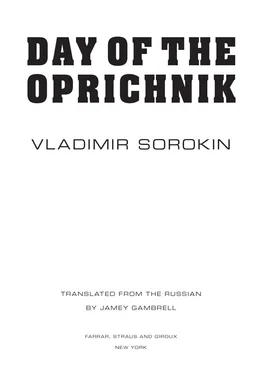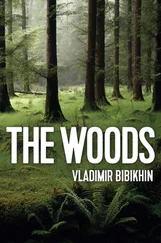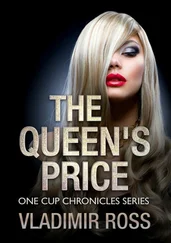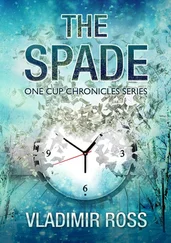Sorokin, Vladimir - Day of the Oprichnik
Здесь есть возможность читать онлайн «Sorokin, Vladimir - Day of the Oprichnik» весь текст электронной книги совершенно бесплатно (целиком полную версию без сокращений). В некоторых случаях можно слушать аудио, скачать через торрент в формате fb2 и присутствует краткое содержание. Год выпуска: 2011, Издательство: Farrar, Straus and Giroux, Жанр: Старинная литература, на английском языке. Описание произведения, (предисловие) а так же отзывы посетителей доступны на портале библиотеки ЛибКат.
- Название:Day of the Oprichnik
- Автор:
- Издательство:Farrar, Straus and Giroux
- Жанр:
- Год:2011
- ISBN:нет данных
- Рейтинг книги:5 / 5. Голосов: 1
-
Избранное:Добавить в избранное
- Отзывы:
-
Ваша оценка:
- 100
- 1
- 2
- 3
- 4
- 5
Day of the Oprichnik: краткое содержание, описание и аннотация
Предлагаем к чтению аннотацию, описание, краткое содержание или предисловие (зависит от того, что написал сам автор книги «Day of the Oprichnik»). Если вы не нашли необходимую информацию о книге — напишите в комментариях, мы постараемся отыскать её.
Day of the Oprichnik — читать онлайн бесплатно полную книгу (весь текст) целиком
Ниже представлен текст книги, разбитый по страницам. Система сохранения места последней прочитанной страницы, позволяет с удобством читать онлайн бесплатно книгу «Day of the Oprichnik», без необходимости каждый раз заново искать на чём Вы остановились. Поставьте закладку, и сможете в любой момент перейти на страницу, на которой закончили чтение.
Интервал:
Закладка:
The next song is about Russia. No questions here, either. It’s a strong piece, finely polished. Next—an historical number: the time of Ivan III. A grim, fateful time in Russian history. A serious struggle for the integrity of the Russian state is under way—a fledgling state, not yet strong, only beginning to stand on its own. There’s thunder and lightning on stage, Ivan’s warriors are heading for the breach, the Metropolitan raises a cross illumined by flickering flames. Rebellious Novgorod, which opposes the unification of Russia, is conquered; the apostates fall on their knees, but Great Prince Ivan Vasilevich’s sword touches their guilty heads with mercy:
“Neither enemie nor adversary be I. I am Protector, Father, and Defender of you and all the Great Russian Kingdom.”
Bells ring. A rainbow shines above Novgorod and over all of Rus. The heavenly birds sing. The Novgorodians bow and sob with joy.
Now, that’s good, that’s appropriate. But the warriors should have broader shoulders and the Metropolitan could be taller, more dignified. And there’s a good deal of unnecessary fuss in the background. The birds fly too low, they’re distracting. The director agrees with the suggestions, and makes notes in his book.
The next act is a page from our recent past, troubled and sad. Three Stations Square in Moscow, during the years of the accursed White Revolt. Simple people mill about, brought out of their homes onto the square by a wave of rebellion, forced to sell whatever comes to hand to earn enough for a piece of bread, stolen from them by criminal rulers. My earliest childhood memories are of those foul times. The Time of the White Pus, which poisoned our Russian bear…back when the inhabitants of Russia stood on the square with teakettles, frying pans, shirts, even shampoo and soap in their hands. Refugees and people who had lost everything flooded into Moscow and traveled there from grief. Elderly men, the war-wounded, veterans and heroes of labor. Seeing that crowd left a bitter taste indeed. The sky above is overcast and dank. Sad music sounds from the orchestra pit. Then, as though a pale ray of hope has suddenly pierced the gloomy picture, the colors of center stage grow warmer and we see three homeless children, rejected by the world: two little girls in torn dresses and a grimy little boy holding a teddy bear. The timid flute of hope comes alive, awakes and sounds, striving upward with its delicate voice. Over the gloomy, sullied square we hear a touching children’s song:
“I hear a voice arising, lovely in the distance—
The voice of dawn, adorned in silver dew.
I hear a voice, and now the road, insistent,
Does daze me like the childhood swings that I once knew.
“O distance lovely, don’t be cruel.
Do not be cruel, oh cruel never be!
From purest streams to lovely distance
The road to lovely distance beckons me.
“I hear a voice arising in the distance,
It summons me to far and marv’lous climes.
I hear a voice; it asks of me, insistent,
What deed I’ve done today to aid tomorrow’s time.
“O distance lovely, don’t be cruel.
Do not be cruel, oh cruel never be!
From purest streams to lovely distance,
The road to lovely distance beckons me.”
Tears well up in my eyes. It’s the hangover , of course. But the dignified Prince Sobakin is sniffing as well. He has a large family, many small grandchildren. The brawny observer from the Secret Department sits still as a statue. Well, of course—they have nerves of steel, they’re ready for anything and everything. The portly head of the Culture Chamber sort of shakes his shoulders like he’s caught a chill—he seems to be fighting off tears, too. The piece hits a raw nerve even in strong, seasoned men. That’s wonderful…
His Majesty awakened in us not simply pride in our country, but compassion for her painful past. Three Russian children stand stretching their hands out to us from the past of an insulted and injured country. And we cannot help them at all.
We approve it.
Next—the present day. A full, bountiful cup. The Moiseev Ensemble performs dances of all the peoples of Great Russia. Here you’ve got the smooth Tatar dances, and the dashing Cossack whirls with sabers drawn; Tambov quadrilles to the sound of an accordion; and Nizhny Novgorod folk dances with their rattles and whistles; the whooping, yelping Chechen circle dance; Yakut tambourines; and the Chukots with their Arctic fox furs; the Kariaksky deer; the Kalmyk rams; Jewish frock coats—and Russian, Russian, Russian dancing till you drop—dashing, boisterous, bonding, reconciling everyone.
No question about this legendary group.
There are two more acts: “Flying Balalaikas,” and “A Young Girl Rushes to a Rendezvous.” Now these are real classics—everything honed, checked, polished. A feast for the eyes. You watch, and it’s just like you’re sledding down a hill. The observer applauds. We do, too. Good for His Majesty’s artistes!
Then comes a short literary piece: “Hello, My Dear Nanny, Arina Rodionovna!” It’s a little old, a bit forced. But the people love it and His Majesty respects it. The head of the Culture Chamber suggests lamely that Pushkin should be younger—the same not-very-young actor, Khapensky, has been playing the poet for the last twelve years. But we all know it’s pointless. The actor is one of Her Highness’s favorites. The director shrugs his shoulders, opens his hands:
“Gentlemen, you must understand, it’s not up to me…”
We understand.
And now we come to the most important act. A new piece on the topic of the day: “Like Hell I Will!”
Each of us squirms in his seat and tenses. The stage is dark, the only sounds are the howl of the wind, and the strumming of the Kazakh dombra and the Russian balalaika. The moon crawls out from behind clouds, illuminating the scene with a faint light. In the middle of the stage is the Third Western Pipeline. The very one that’s caused so much hullabaloo the last year and a half, so much trouble and concern. The pipeline stretches across the stage, through Russian forest and field; sparkling in the dim light, it arrives at the Western Wall. There it passes through a flow-regulating valve marked closed, dives into the wall, and moves farther westward. Our border guard stands there with an automatic ray gun, looking through binoculars toward the other side. Suddenly the dombras and balalaikas grow anxious, a warning bass sounds—and near the valve a molehill erupts. In a flash, a mole-saboteur in black goggles crawls out, looks around, sniffs the air, jumps, grabs the valve, digs his huge teeth into it with all his might. He’s just about to turn it, to let the gas through. But—a ravaging ray flashes from the wall and cuts the mole in half! The mole’s guts tumble out, a howl rends the air, and the thieving saboteur breathes his last. Lights flare, and three bold border guards, full of mettle, leap from the wall. Their jumps are agile, accompanied by handsprings and valiant whistles. One of them holds an accordion, the second a tambourine, the third wields wooden spoons. Each of them wears an automatic, loyal and true, on his back. The fine young border guards sing:
“The valves we closed up:
Like His Majesty told us.
But fiendish foes did try
To suck our gas completely dry.
“Right off we told them: ‘No! We’ll fight!’
And honed our eagle gaze.
Europa Gas, that parasite,
For Russian gas must pay!
“Just try to stop those cyberpunksters,
Across the wall’s most chilly side.
What bifurcations, made by funksters,
Like mushrooms sprout both far and wide.
“Each time more brazen do they act,
But wait a moment, contemplate,
Читать дальшеИнтервал:
Закладка:
Похожие книги на «Day of the Oprichnik»
Представляем Вашему вниманию похожие книги на «Day of the Oprichnik» списком для выбора. Мы отобрали схожую по названию и смыслу литературу в надежде предоставить читателям больше вариантов отыскать новые, интересные, ещё непрочитанные произведения.
Обсуждение, отзывы о книге «Day of the Oprichnik» и просто собственные мнения читателей. Оставьте ваши комментарии, напишите, что Вы думаете о произведении, его смысле или главных героях. Укажите что конкретно понравилось, а что нет, и почему Вы так считаете.












